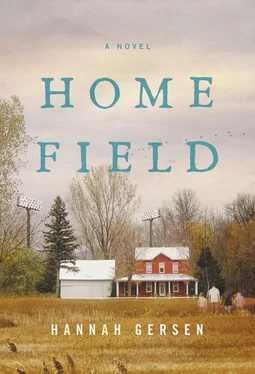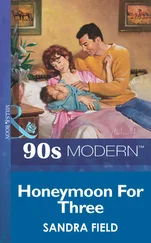DEAN COULD TELL from the way Stephanie moved that she’d been drinking; she’d lost her specificity, all the micromovements and small gestures that made her special to him. Her dark hair was in a low ponytail at the nape of her neck, with a few long strands left loose. She came in through the side door and headed straight to the refrigerator for a glass of orange juice.
“Stephanie,” he said quietly, so she wouldn’t startle. He was sitting at the kitchen table, waiting.
“Dad!” She turned around, surprising him with a warm smile — an intoxicated smile, but still.
“Late night at the Red Byrd?”
“Yeah, and then I went out.” She sat down at the table to drink her juice. “Sorry, I should have called. I feel bad, you waited up.”
Her lie was so transparent that he was reminded of the fibs she told when she was a little girl, how obvious they were, and how stubbornly she clung to them. Lying, in small children, was a sign of intelligence.
“Steph, the boys and I went to the Red Byrd for dinner.”
“You came to check up on me?”
“I wanted to see you,” Dean said. “And the boys did, too. You left them alone.”
“It was only for, like, fifteen minutes.”
“They’re little kids.”
“I’m sorry.” She got up and poured herself some more juice. “Mitchell called and he really needed me to come over — he’s going through a hard time — so I got Katie to cover my shift. And I didn’t tell you because I didn’t want it to be some big thing. But I had to go, he’s my best friend.”
It bugged Dean that Mitchell was her designated “best friend.” Why couldn’t she be best friends with another girl, a typical girl, a girl who was happy, who didn’t view high school as one big hard time?
“How much have you had to drink?” Dean asked.
“I wasn’t driving,” she said. “Mitchell dropped me off.”
“So where’s your car?”
“It’s parked at Sarah Auerbach’s. She had a party, okay?”
He noticed now that she was dressed up, wearing a flowered sundress. It was the kind of modest, feminine dress Dean preferred for her to wear — or would have been, if Stephanie hadn’t cut it short, leaving the edges ragged.
“Is that one of your mother’s dresses?”
“Yeah.” Stephanie tugged at the hem of her skirt, pulling on a loose thread. “It’s not like Mom cares. She’s gone. The dead don’t care, that’s what Mitchell says.”
Robbie’s phrase, dead-lady clothes, came into Dean’s mind. Along with Robbie and his flushed cheeks, Nic’s pale blue dress.
“I don’t care what Mitchell has to say,” Dean said.
“You’ve always been hostile toward him. What’s that about? He’s really smart. He’s probably the smartest person I’ve ever met. Just because he doesn’t care about football doesn’t mean he’s not worth your time.”
“Steph, I don’t want to talk about your friend right now.”
“I’m just trying to have a conversation,” she said, slurring as she navigated conversation ’s four syllables. “But if you just want to walk around all stoic, that’s fine, we can pretend everything’s okay. Just like we did with Mom.”
“That’s something, coming from the girl who barely spoke to her mother for a year.”
Stephanie got up and put her juice glass in the sink. She stood there and Dean could tell by the way her shoulders were hunched forward that she had begun to cry. It had been so long since he had seen her cry that he was almost heartened by her tears, by their intimacy. But then, seeing her pale face reflected in the darkened window above the sink, he felt as if she had eluded him yet again, as if the cheerful girl he had once known — the girl he hoped would be restored to him at the end of adolescence — had been displaced by this ghost of a girl.
“Sweetheart, I’m sorry, I’ve had a rough day. I lost one of my best players, a linebacker, and we don’t have a good replacement. I have to rethink everything.”
“That sounds pretty stressful,” she said drily.
“I’m sure it doesn’t seem like a big deal to you, but if you knew about football—”
“I know about football. I just don’t find it especially interesting.”
Dean turned away to gather up his notes, as well as Garrett’s. He was tired; his eyelids burned. He couldn’t understand why his kids were giving him so much grief. He wasn’t the one who’d left them.
“Where is it written that I have to like football?” Stephanie said.
He faced her again. “Look, I don’t expect you to care about the holes in my playbook, I really don’t. But I do expect you to give a shit about your younger brothers, who really need you right now.”
“I’m so sick of this. I go out, I let loose for one night, and you make me feel guilty. I’ve been babysitting them all summer long.” Stephanie swiped at her eyes, smearing her already smudged makeup. “Aunt Joelle says I’m the one holding this family together.”
“Don’t bring Joelle into this.”
“Why shouldn’t I? You’re just going to dump Robbie and Bry on her when I leave.”
“I’m working on getting a sitter,” Dean said, straining to keep his voice even. “I was going to ask around at church tomorrow. I was hoping you’d come with me.”
“I’m supposed to help with Aunt Joelle’s barbecue.”
“So am I. We can go after.”
“I thought you didn’t want to go.”
“That doesn’t mean I’m not going.”
He matched her stubborn gaze. She didn’t like church; he didn’t like Joelle. He had her in a bind. She couldn’t say no without making him look like a better person.
“Fine, I’ll go.”
She turned the lights off as she left the kitchen — out of habit or spite, Dean couldn’t tell. The darkness was a relief. Cool air came through the window above the sink, a hint of autumn. It was something Dean noticed every August, that unexpected hint of crispness, like a pocket of cold water in a sun-warmed lake. Dean had met Nicole in August, just a few weeks after he’d moved to Willowboro. He’d gone to the country club to inquire about membership, and she had been at the front desk. The club was in the midst of a renovation; it was being changed from a small, family-run golf course to an “outdoor recreation facility” with a pool, tennis courts, driving range, and, for the winter months, a small gym with racquetball courts and a sauna. With her fresh, makeup-free face and her optimistic smile (a willed optimism, Dean realized now), Nicole seemed a part of that transformation. She seemed like the future of this new place that he had moved to. Later he told people that he knew he wanted to marry her at first sight, because that was what people said about their brides, but the truth was, his wish on that night was just to be near her again. It was unbelievable to him that she was single; later he learned that everyone still thought of her as Sam’s girl. People warned him to be careful, that she was on the rebound. She came to every game; she knew about football. Dean didn’t care how she’d learned it. All that mattered was that she seemed happy when she was with him. She had been so sad when they met; she had been sad and he had made her happy. Dean couldn’t understand why he was never able to do it again.
The sun felt like an assault when Dean woke up the next morning. He had slept through his alarm. Downstairs, he found Stephanie making breakfast for the boys, without a trace of the night’s excesses on her pale face. Youth. His players displayed the same imperviousness.
Everyone needed a shower, and by the time they left the house they were late. They arrived at church midway through the opening hymn, and Dean felt self-conscious as he walked down the side aisle, looking for space for the four of them. On the way in, he had noticed a sign-up sheet in the foyer that said, “Support for the Renner Family”; beneath it was a list of the foods that had appeared on his doorstep over the past two months. He wanted to take it down but knew he should go through the proper channels, whatever they were. Church politics had always been Nicole’s domain.
Читать дальше












